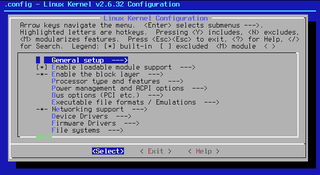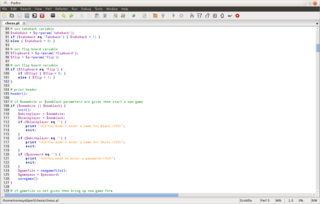Berkeley DB (BDB) is an embedded database software library for key/value data, historically significant in open-source software. Berkeley DB is written in C with API bindings for many other programming languages. BDB stores arbitrary key/data pairs as byte arrays and supports multiple data items for a single key. Berkeley DB is not a relational database, although it has database features including database transactions, multiversion concurrency control and write-ahead logging. BDB runs on a wide variety of operating systems, including most Unix-like and Windows systems, and real-time operating systems.

ncurses is a programming library providing an application programming interface (API) that allows writing text-based user interfaces (TUI) in a computer terminal-independent manner. It is a toolkit for developing graphical user interface (GUI)-like application software that runs under a terminal emulator. It also optimizes screen changes, to reduce the latency experienced when using remote shells.

Perl is a high-level, general-purpose, interpreted, dynamic programming language. Though Perl is not officially an acronym, there are various backronyms in use, including "Practical Extraction and Reporting Language".
Cross Platform Component Object Model (XPCOM) is a cross-platform component model from Mozilla. It is similar to Component Object Model (COM),Common Object Request Broker Architecture (CORBA) and system object model (SOM). It features multiple language bindings and interface description language (IDL) descriptions; thus programmers can plug their custom functions into the framework and connect it with other components.

curses is a terminal control library for Unix-like systems, enabling the construction of text user interface (TUI) applications.

In computing, text-based user interfaces (TUI), is a retronym describing a type of user interface (UI) common as an early form of human–computer interaction, before the advent of bitmapped displays and modern conventional graphical user interfaces (GUIs). Like modern GUIs, they can use the entire screen area and may accept mouse and other inputs. They may also use color and often structure the display using box-drawing characters such as ┌ and ╣. The modern context of use is usually a terminal emulator.

Fast Light Toolkit (FLTK) is a cross-platform widget library for graphical user interfaces (GUIs), developed by Bill Spitzak and others. Made to accommodate 3D graphics programming, it has an interface to OpenGL, but it is also suitable for general GUI programming.

PyQt is a Python binding of the cross-platform GUI toolkit Qt, implemented as a Python plug-in. PyQt is free software developed by the British firm Riverbank Computing. It is available under similar terms to Qt versions older than 4.5; this means a variety of licenses including GNU General Public License (GPL) and commercial license, but not the GNU Lesser General Public License (LGPL). PyQt supports Microsoft Windows as well as various kinds of UNIX, including Linux and MacOS.
Windows Services for UNIX (SFU) is a discontinued software package produced by Microsoft which provided a Unix environment on Windows NT and some of its immediate successor operating-systems.

The Chemistry Development Kit (CDK) is computer software, a library in the programming language Java, for chemoinformatics and bioinformatics. It is available for Windows, Linux, Unix, and macOS. It is free and open-source software distributed under the GNU Lesser General Public License (LGPL) 2.0.
Crack is a Unix password cracking program designed to allow system administrators to locate users who may have weak passwords vulnerable to a dictionary attack. Crack was the first standalone password cracker for Unix systems and the first to introduce programmable dictionary generation as well.

Linux is a generic name for a family of open-source Unix-like operating systems based on the Linux kernel, an operating system kernel first released on September 17, 1991, by Linus Torvalds. Linux is typically packaged as a Linux distribution (distro), which includes the kernel and supporting system software and libraries, many of which are provided by the GNU Project.

Tk is a cross-platform widget toolkit that provides a library of basic elements of GUI widgets for building a graphical user interface (GUI) in many programming languages. It is free and open-source software released under a BSD-style software license.

JChemPaint is computer software, a molecule editor and file viewer for chemical structures using 2D computer graphics. It is free and open-source software, released under a GNU Lesser General Public License (LGPL). It is written in Java and so can run on the operating systems Windows, macOS, Linux, and Unix. There is a standalone application (editor), and two varieties of applet that can be integrated into web pages.

Padre is a multi-language software development platform comprising an IDE and a plug-in system to extend it. It is written primarily in Perl and is used to develop applications in this language.

GTK is a free software cross-platform widget toolkit for creating graphical user interfaces (GUIs). It is licensed under the terms of the GNU Lesser General Public License, allowing both free and proprietary software to use it. It is one of the most popular toolkits for the Wayland and X11 windowing systems.
The following outline is provided as an overview of and topical guide to the Perl programming language:

Cloud9 IDE is an Online IDE, published as open source from version 2.0, until version 3.0. It supports multiple programming languages, including C, C++, PHP, Ruby, Perl, Python, JavaScript with Node.js, and Go.












